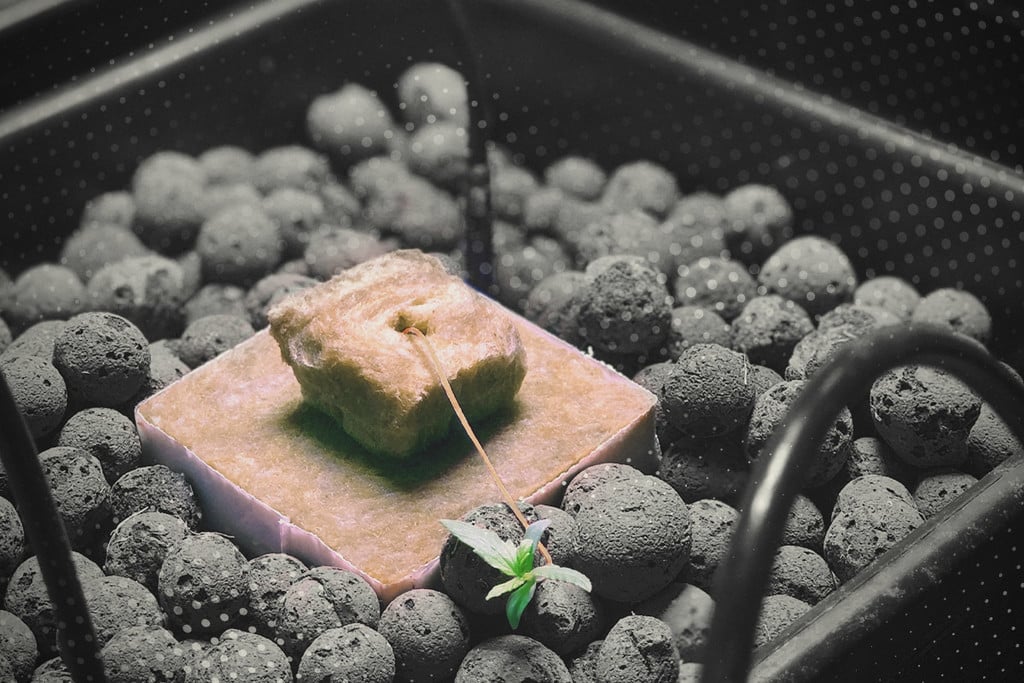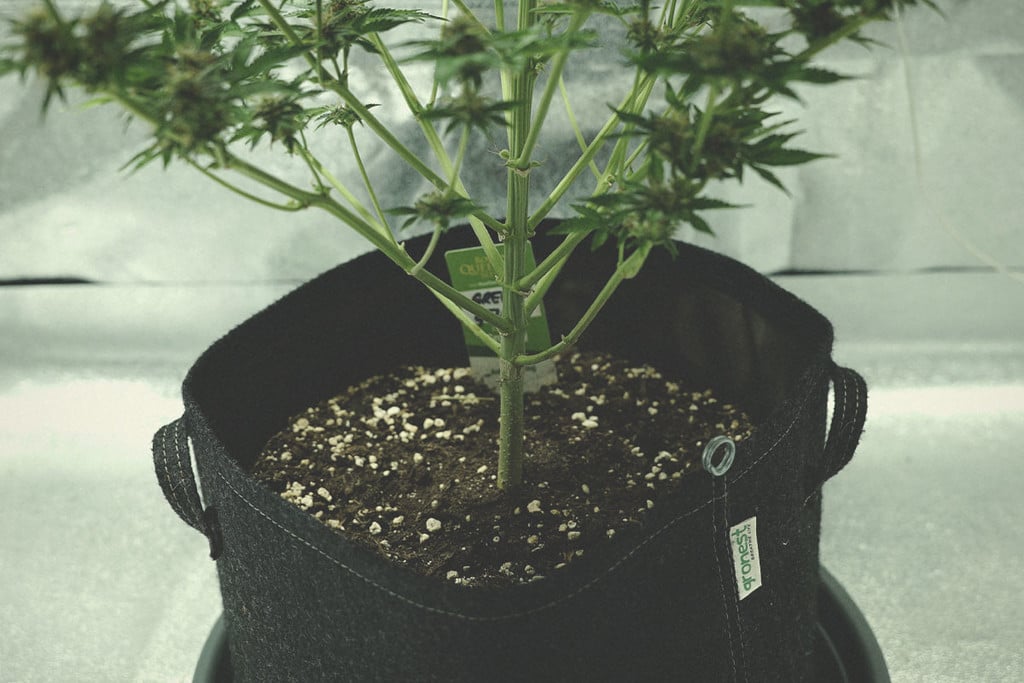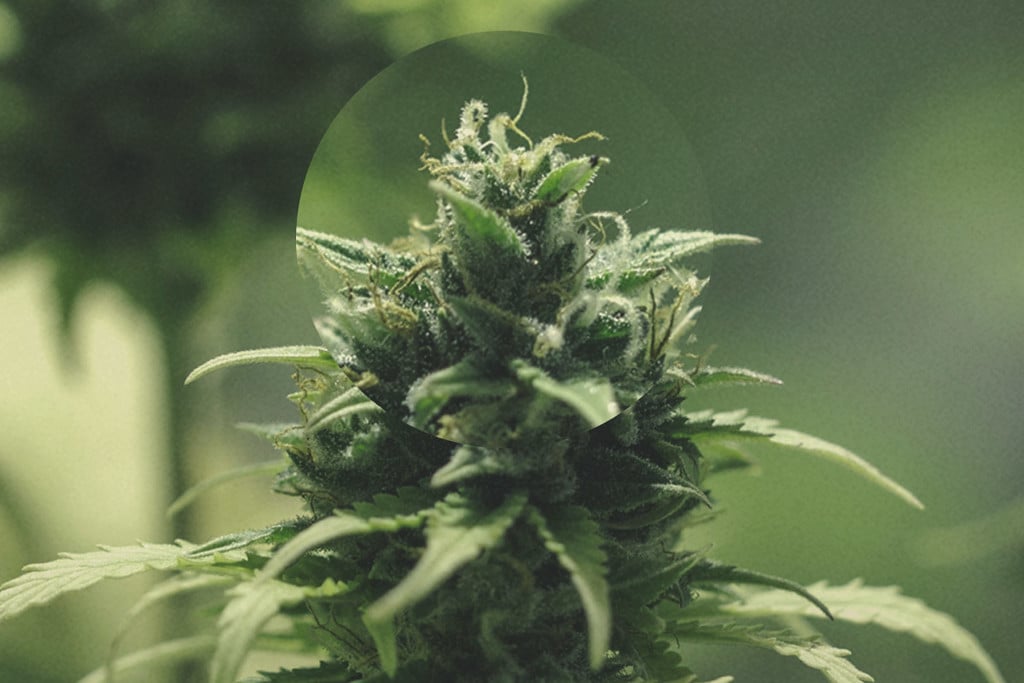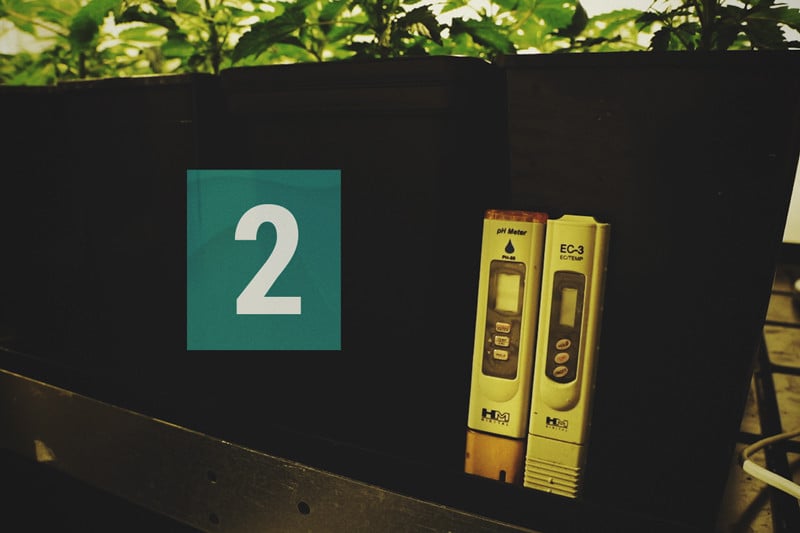.
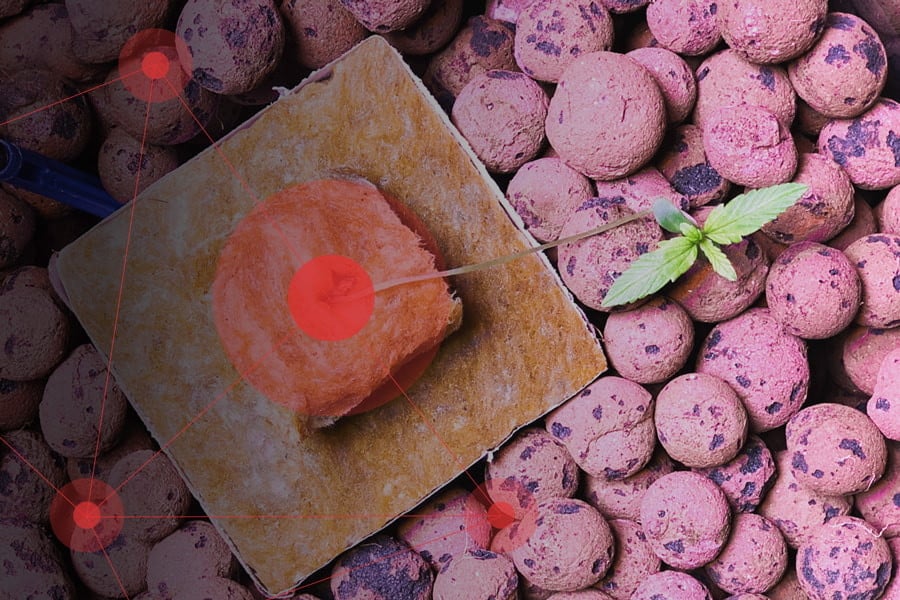
How to Prevent Damping Off When Growing Weed
Damping off can destroy a cannabis grow before it's even got off the ground (literally). This condition is caused by a number of different pathogenic fungi, and while it can't be cured, it can be easily avoided.
Damping off is a fast-acting condition that can kill cannabis plants mere days after they sprout from the ground. In fact, it can act so fast that it can stop plants from sprouting at all. This condition proves fatal for the cannabis seedlings it affects, but it needn’t spell doom for the entire crop. What’s more, with good practice, you can ensure that the likelihood of it occurring in the first place is very low.
In this article, we look at the different causes of damping off, the environmental conditions that make it more likely, and how to prevent it and get your cannabis plants past their initial stage of life!
Contents:
What Is Damping Off?
Damping off is the generic name given to a fungal infection that affects cannabis plants in the seedling stage of growth. It gets its name because the condition causes the young plants to appear damp and soggy, becoming limp and wilting. After these symptoms appear, the seedling will soon collapse and die.
The microbes responsible for causing damping off attack the roots of the plant. If a plant becomes infected, then there’s very little you can do to save it, and the condition is usually fatal. However, if you isolate infected plants, you still have a good chance of keeping the rest of the crop safe.
Damping Off In Cannabis Seedlings: The Microbial Culprits
There are several types of rhizosphere-dwelling microbes that make a host of a young cannabis plant’s roots, causing it to damp off.
- Pythium: Perhaps the most common offender, Pythium (aka root rot) is a fungus that attacks plant roots and can quickly kill them. This fungus is dreaded among the cannabis growing community.
- Phytophthora: This member of the oomycete group is responsible for a huge amount of crop loss around the world. Like Pythium, Phytophthora is also a fungus and thrives in waterlogged growing media.
- Rhizoctonia: Another fungus, from the order Cantharellales, Rhizoctonia is yet another pathogen that loves wet media and attacks the roots of plants, causing damping off.
- Fusarium: Fusarium is a fungus that enters the xylem of cannabis plants and stops them from transporting water and nutrients around themselves, causing them to die.
The Symptoms of Damping Off
The symptoms of damping off are similar to those of overwatering. This is because both situations lead to root rot, causing the plant to be unable to take up water and nutrients properly. In fact, one of the reasons that overwatering can cause root rot is that it creates the perfect environment for the pathogens responsible for damping off.
Symptoms of damping off include:
- Plants appear soaked and wilt
- Lower stem may discolour
- Seedlings collapse from the base
- If you were to look at the roots, they would appear brown and rotten
- Mould growth on soil
It’s worth noting that there are two distinct types of damping off:
- Pre-emergent damping off: The seedling fails to sprout.
- Post-emergent damping off: The seedling sprouts but then collapses and dies.
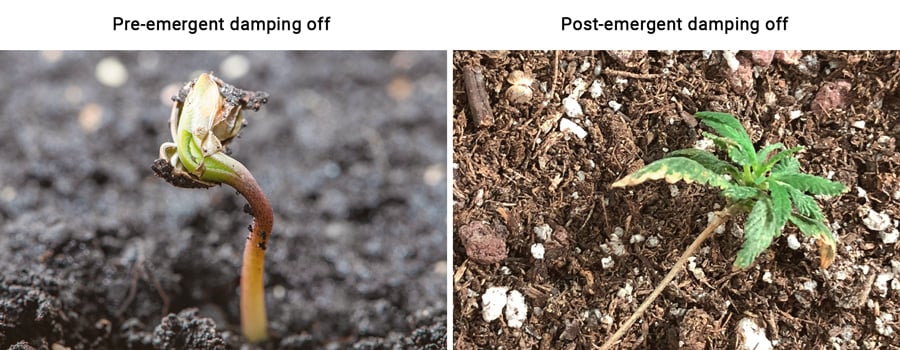
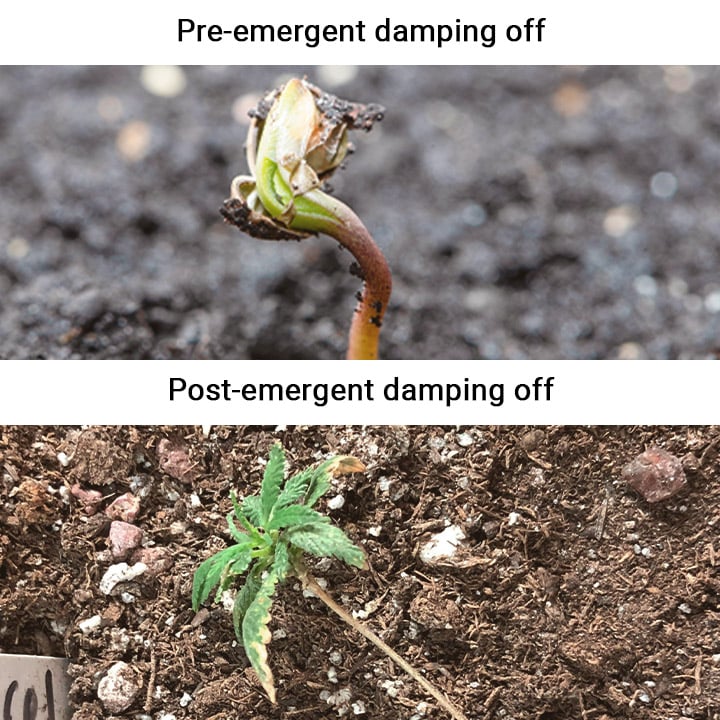
What Causes Marijuana Damping Off?
Ultimately, pathogens such as those listed above are responsible for cannabis plants damping off. However, certain conditions make the occurrence of these pathogens more likely, and understanding these is crucial if you want to keep your marijuana seedlings healthy.
Overwatering
First and foremost, overwatering your growing medium will provide the perfect conditions for fungal pathogens to make a home and then quickly kill your plants. Although seeds need damp soil to germinate, there’s no reason to soak the soil. Therefore, you should learn how to properly water cannabis plants to avoid damping off.
Waterlogged soil is probably the main reason that damping off occurs. In certain agricultural settings, this can be out of our control. But if growing cannabis, especially indoors, we can control exactly how moist the soil is, and thus this major cause of damping off can be avoided.
Poor Drainage
If your watering practice is good, but the pots have little or no drainage, then the soil may still become waterlogged and your plants could still damp off.
So it’s important to grow in containers that have adequate drainage. Especially at the seedling stage, it’s unlikely that you’ll be using inappropriate containers, but is the growing medium loose enough? Certain soils and other media hold water more or less effectively than others, and choosing a well-draining substrate is really important for cannabis.
Humid Climate
Very humid environments can also increase the chances of damping off. This can be tricky as seeds like very high humidity to germinate, and the fungus may already have appeared by this point. If all other factors are correct, then high humidity should be acceptable. But if other factors are off, then it can worsen the situation.
Learn the correct humidity levels for different stages of a cannabis plant’s life cycle, and you’ll put yourself in good stead.
Low Soil Temperature
A high moisture content and a low temperature is the perfect combination for fungal growth. This is one of the reasons that even outdoor growers choose to germinate seeds indoors, in more controlled conditions. Keeping soil at a comfortably warm temperature during the earliest stages of a plant's growth will help to prevent damping off, and generally allow a plant to grow healthily.
Infected Soil and Compost
Of course, if you use soil or compost that is already infected, then your cannabis plants don’t really stand a chance. For this reason, you should be very picky when it comes to choosing the medium for your plants.
The easiest solution is to buy high-quality soil, which will come without pathogens. If you choose to make your own soil mix, then you should pasteurise it first to kill off any potential pathogenic growth. Most importantly, never reuse soil without first sterilising it, as any dormant fungal growth will be waiting for the tender roots of seedlings.
Crowded Seedlings
Seedlings whose roots are all growing in close proximity to one another are at a greater risk of damping off. First, the more compact nature of their growth makes them more susceptible to infection. And second, if one does become infected, then it will quickly spread among all the plants, destroying the whole crop.
For this reason, it’s best to germinate seeds in isolation.
Infected Seeds
It’s not just soil that can come infected, but seeds themselves. High-quality seeds from reputable sellers should never come infected. However, bagseed, low-quality seeds, or seeds from a friend very well could.
Seedling Stress
Seedlings have very weak immune systems and are therefore highly susceptible to infection. For this reason, growers should endeavour to give their seedlings a stress-free start to life, for best results.
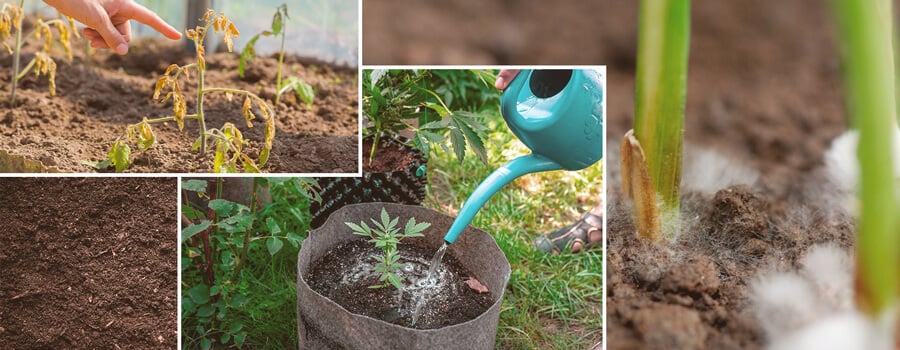
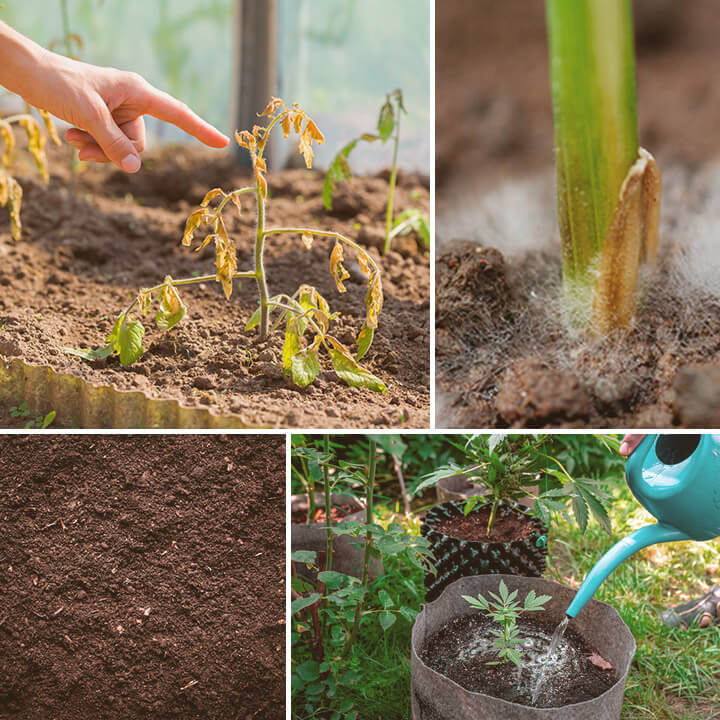
How to Respond to Damping Off
The bad news is that you can’t cure seedlings that are damping off. However, you can respond effectively to minimise damage to the rest of the grow.
- Isolate infected seedlings from healthy ones: Immediately remove any seedlings that are showing signs of damping off and place them in isolation. If they appear to make a recovery, then you can bring them back to the grow. If they go on to die, then at least you’ve greatly reduced the chances of the condition spreading to other plants.
- Improve air circulation: Use a fan or ventilation system to improve ventilation in the grow space. This will reduce the chances of the fungal infection developing further, as circulation will lower the humidity in the room.
- Remove and dispose of infected soil: Any infected soil should be quickly taken away and disposed of. You could technically sterilise it and reuse it, but unless you know what you are doing, it might be better to throw it away.
- Adjust your potting mix: Depending on what caused the damping off, you might need to adjust your potting mix. This could mean using a soil type that drains better; it might mean sterilising your compost next time, or it could mean adding mycorrhizal fungi to the mix, as these have a symbiotic relation with plant roots and will help to defend against pathogenic fungi.
How to Prevent Damping Off When Growing Weed
Prevention is always better than a cure, but when it comes to damping off, it really is the only solution. So, here’s how to prevent damping off in cannabis seedlings.
Use Clean Pots and Trays
Be hygienic! Get off to a good start and use clean containers to grow your cannabis in. The containers needn’t necessarily be new, but you should clean them thoroughly if they’ve been used before.
You could do this by pasteurising them in very hot water for around an hour, or you could sterilise them with specific cleaning products.
Water Appropriately
Learn how to water properly. For seedlings, this means keeping the soil moist, but never soaking it. Basically, if the soil is damp, then it doesn’t need to be watered. Only when the top of the soil becomes dry to the touch should you water again, and then only lightly.
Manage Humidity
Keep humidity at the appropriate level for seedlings. Humidity, or relative humidity (RH), is related to temperature. So the adequate temperature for cannabis seedlings is 20–25ºC with an RH of 65–70%.
Sow Seeds Thinly
Don’t pack seeds too closely together. Most likely, you’ll sow in individual containers with space for each seed. However, if this is not the case, then you shouldn’t plant seeds any closer than 5cm together.
Apply Lactic Acid Bacteria
Administering lactic acid bacteria to the cannabis growing medium is thought to help prevent damping off[1]. For a small-scale, casual home grow, this step might be overkill, as general good practice should do the job. However, for bigger grows with more to lose, taking this extra step can help to rear a large crop through to harvest.
Inoculate With Mycorrhizal Fungi
In nature, plants and mycorrhizal fungi have been working together for many years indeed. But among growers, many are only just beginning to realise how important this symbiosis might be.
Mycorrhizal fungi colonise the root systems of plants and extract key nutrients from the plant. In return, they break down nutrients from the soil and deliver them to plants in a much more accessible fashion. Further, mycorrhizal fungi help to protect plant roots from a range of pathogens that live in the soil.
So not only does amending soil with mycorrhizal fungi help to protect plants from damping off, but it will also help them to grow more efficiently, leading to a better harvest!
Leverage Trichoderma
Trichoderma is another beneficial fungus that, if added to the substrate, can both improve growth and help to defend against pathogens. Similar to mycorrhizal fungi, it too breaks down nutrients in the soil and makes them much easier for a plant to absorb.
Damping Off: Keep Your Seedlings Safe
Damping off is a real problem, as by the time you’ve spotted it, it’s too late. If you do identify it, the best you can do is remove the infected plant(s) and hope that the rest of the crop remains healthy and continues to grow.
However, with appropriate precautions, you can greatly reduce the risk of seedlings damping off in the first place. There are two main takeaways here. First, familiarise yourself with good growing practice so you rear your plants in a way that supports them and reduces the chance of certain fungi developing. And second, use nature to your advantage! Certain beneficial fungi should be added to your soil, as they will improve plant growth and create a natural defence against damping off.
- Isolation and Identification of Ssome Lactobacillus Spp. Bacteria https://iopscience.iop.org





























